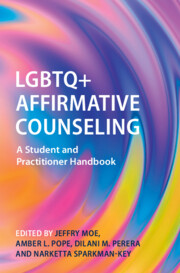Book contents
- LGBTQ+ Affirmative Counseling
- LGBTQ+ Affirmative Counseling
- Copyright page
- Contents
- Figure
- Tables
- Box
- Contributors
- Part I Foundations of LGBTQ+ Affirmative Counseling
- Part II LGBTQ+ Lifespan Development and Family Dynamics
- 5 Lifespan Development for Transgender and Gender-Diverse People
- 6 Sexual-Affectional Orientation Lifespan Development
- 7 Historical Perspectives on Gender Identity Development
- 8 Historical Perspectives on Sexual-Affectional Identity Development
- 9 Family and Relationship Dynamics and LGBTQ+ Mental Health
- Part III Assessment and Treatment in LGBTQ+ Affirmative Counseling
- Part IV New Directions in LGBTQ+ Affirmative Counseling
- Index
- References
7 - Historical Perspectives on Gender Identity Development
from Part II - LGBTQ+ Lifespan Development and Family Dynamics
Published online by Cambridge University Press: 31 October 2024
- LGBTQ+ Affirmative Counseling
- LGBTQ+ Affirmative Counseling
- Copyright page
- Contents
- Figure
- Tables
- Box
- Contributors
- Part I Foundations of LGBTQ+ Affirmative Counseling
- Part II LGBTQ+ Lifespan Development and Family Dynamics
- 5 Lifespan Development for Transgender and Gender-Diverse People
- 6 Sexual-Affectional Orientation Lifespan Development
- 7 Historical Perspectives on Gender Identity Development
- 8 Historical Perspectives on Sexual-Affectional Identity Development
- 9 Family and Relationship Dynamics and LGBTQ+ Mental Health
- Part III Assessment and Treatment in LGBTQ+ Affirmative Counseling
- Part IV New Directions in LGBTQ+ Affirmative Counseling
- Index
- References
Summary
This chapter will discuss information pertinent to understanding gender identity. We will discuss key terms and the importance of understanding language usage as a foundation for communicating respect, knowledge, and awareness. Counselors create safe and affirming spaces for the clients we serve. As such, counselors must understand the complex past and historical discrimination clients have experienced while examining their own understanding of these communities. Counselors will also seek to understand their ethical and legal responsibilities to marginalized and minoritized communities while understanding the importance of cultural considerations. Barriers to services and our collective responsibility to address these barriers rooted in discrimination will be addressed. While counselors maintain culture humility in an attempt to avoid ethnocentrism regarding their own beliefs around gender identity development, we seek to grow in knowledge and awareness. While antitrans legislation continues to increase, counselors must remain steadfast in their approach to advocacy and to providing ethical care.
- Type
- Chapter
- Information
- LGBTQ+ Affirmative CounselingA Student and Practitioner Handbook, pp. 111 - 129Publisher: Cambridge University PressPrint publication year: 2024

